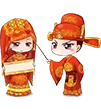春节意义(春节的意义英文表述简短)
- 花无痕
- bazi001
- 2024-01-19 10:21:02
1、春节意义
春节是传统的重要节日,被誉为“万家团圆、福慧交集”的时刻。它不仅代表着新的开始,更承载着人们对美好生活的向往和对传统文化的热爱。对于人来说,春节既是民族记忆的延续,也是情感联结的纽带。
春节有着深厚的历史和文化底蕴。据考古学家的研究,春节的起源可追溯到几千年前的古代华夏文明。早在新石器时代晚期,我们的祖先就开始进行以庆贺丰收为主题的祭祀活动了。因而,春节可以看作是传统农耕文化的组成部分。从古代至今,春节依旧以庆贺丰收、祈福报吉为核心,但演变出了诸多独具特色的习俗和民俗活动,如贴年画、放鞭炮、舞龙舞狮、赏花灯等等。这些丰富多彩的庆典活动不仅增添了节日的喜庆气氛,更为后代传承了优秀的传统文化。
同时,春节也代表着家庭团聚和亲情的重要时刻。由于社会的高速发展,人们的生活节奏越来越快,亲情关系开始淡化。春节时人们返乡团聚,共度佳节,成为一种特殊的仪式感。在这个时刻,久别重逢的亲人们坐在一起,互相倾诉近况,分享彼此的喜怒哀乐。无论是老人们对子女的嘘寒问暖,还是子女们对长辈的孝顺体贴,都在无言中表达着亲情的重要性。这样的团聚不仅温暖了家庭,也有助于培养和加深家庭成员间的感情。
春节也是传统文化的重要载体。作为人重要的传统节日,春节潜移默化地影响着人们的价值观和行为方式。在这个时刻,人们会尊敬长辈、孝顺双亲,关心他人、乐于助人,传递着传统文化的精髓内涵。过年期间,人们会讲述神话传说,传承民间故事,弘扬中华优秀的传统文化。同时,春节期间还有拜年祭祖等重要仪式,这种传统的仪式感能够激发人们对传统文化的兴趣,培养对历史文化的敬重和热爱。
在生活中,春节除了代表传统文化的重要意义外,也承担着经济和社会功能。春节期间,人们会购买年货、赠送礼物,这对于推动商业经济的发展有着积极的促进作用。同时,春节也是文化交流和旅游的黄金时期。越来越多的外国游客来到,体验农历新年的传统魅力,也为中外文化交流搭建了重要的平台。
春节作为重要、具特色的传统节日,承载着深厚的历史文化和情感纽带。它以其独特的庆典活动、家庭团聚的意义、传统文化的传承、经济社会的功能等多重意义成为人民心中的共同记忆和文化符号。春节的意义不仅仅是舒缓生活的压力、享受家庭的温情,更是弘扬中华传统文化的价值追求,唤醒人们对中华优秀传统的自豪和热爱,为构建和谐社会贡献着积极力量。

2、春节的意义英文表述简短
The Meaning of the Chinese Spring Festival
The Spring Festival, also known as the Chinese Lunar New Year, is the most important traditional festival in China. It is celebrated on the first day of the lunar calendar, which usually falls between late January and early February. The festival lasts for 15 days, and during this time, families gather together and participate in various activities to usher in the new year.
The Spring Festival holds deep cultural and historical significance for the Chinese people. It marks the beginning of a new year, symbolizing fresh beginnings, new opportunities, and hope for a prosperous future. As the festival approaches, people engage in thorough house cleaning to sweep away any bad luck from the past year and make room for new luck to enter their lives.
One of the most prominent aspects of the Spring Festival is the reunion of families. It is a tradition for Chinese people to return to their hometowns and celebrate the festival with their loved ones. Family members from different parts of the country, or even abroad, come together, sharing meals, exchanging gifts, and enjoying quality time. This reunion embodies the deep value Chinese culture places on family and filial piety.
During the Spring Festival, people also hold religious ceremonies and make offerings to their ancestors. They burn incense and leave offerings of food and money at ancestral altars, expressing respect and gratitude for their ancestors' guidance and blessings. The act of honoring ancestors is believed to bring good fortune and protection to the family.
Another integral part of the Spring Festival is the traditional lion and dragon dances. These performances are believed to ward off evil spirits and bring good luck and fortune for the coming year. Dancers dressed in colorful lion and dragon costumes mimic the movements and behavior of these mythological creatures, accompanied by the energetic beats of drums and cymbals. The dances are a spectacular sight, captivating both young and old.
Fireworks and firecrackers are an essential element of the festival. The loud noises and vibrant colors of these fireworks are believed to frighten away evil spirits and bring luck and happiness. The sky lights up with a dazzling display during the Spring Festival, creating a festive atmosphere that ignites excitement and joy.
Moreover, the Spring Festival is a time for people to indulge in traditional foods and delicacies. Dumplings, fish, rice cakes, and other symbolic dishes are prepared and shared among family and friends. Each dish brings its own special meaning, such as prosperity, togetherness, and good fortune. These traditional foods not only satisfy the taste buds but also serve as a way to pass down cultural heritage through generations.
In recent years, red envelopes, or "hongbao," have become a popular tradition associated with the Spring Festival. These red envelopes are filled with money and given as gifts to children, symbolizing good luck and prosperity. It is a gesture of goodwill and blessings from elders to the younger generation.
The meaning of the Chinese Spring Festival goes far beyond its cultural and historical significance. It is a time when people come together, expressing love, gratitude, and hope. It serves as a reminder to cherish family ties, honor traditions, and embrace the new year with optimism and enthusiasm. The festival creates a sense of belonging, unity, and renewal, making it a cherished and highly anticipated time for Chinese people around the world.

相关文章
推荐内容
- 2024年09月20日今年多大?属什么的?
- 2024年09月20日是什么命?八字好不好?
- 八字看何时结婚女命更验,八字中晚婚年龄一般是多少岁
- 摩羯座女人是什么样的女人?摩羯座女生性格特征分析(超准)
- 戊戌流年能发财的八字,注定要经商发财的八字
- 为什么狮子女让男人着迷?狮子座女孩有吸引力
- 巨蟹座男人“吝啬”吗?十二星座被误解为“吝啬”星座
- 天蝎座男人的性格特征是什么?天蝎座男人喜欢哪种类型的女孩?
- 金牛座女孩有什么惊人的能力?金牛座女人的真实性格
- 水瓶座最适合什么数字?水瓶座的幸运数是什么?
- 射手座女孩的性格有什么特点?与射手座女孩交往的禁忌是什么?
- 金牛座配哪个星座?金牛座配对星座排名
- 老黄历2024年黄道吉日







